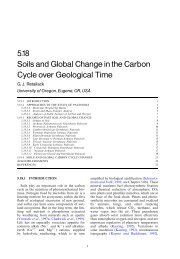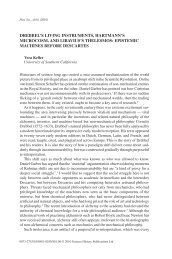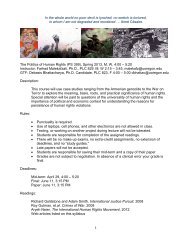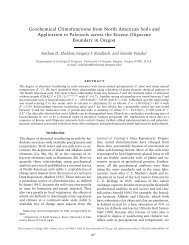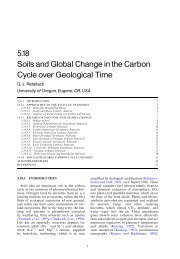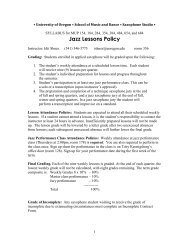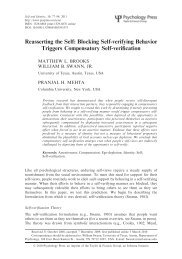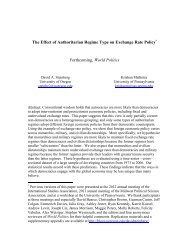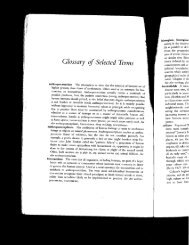Methods for Political Analysis I - University of Oregon
Methods for Political Analysis I - University of Oregon
Methods for Political Analysis I - University of Oregon
- No tags were found...
Create successful ePaper yourself
Turn your PDF publications into a flip-book with our unique Google optimized e-Paper software.
Department <strong>of</strong> <strong>Political</strong> Science<br />
Instructor: David Steinberg<br />
<strong>University</strong> <strong>of</strong> <strong>Oregon</strong> Fall 2012<br />
<strong>Methods</strong> <strong>for</strong> <strong>Political</strong> <strong>Analysis</strong> I<br />
Course Description:<br />
This course is an introduction to quantitative research methods in political science. The<br />
class begins by with a brief overview <strong>of</strong> the goals <strong>of</strong> social science and the strengths and<br />
weaknesses <strong>of</strong> different research methodologies. The first major part <strong>of</strong> the class focuses<br />
on statistical techniques <strong>for</strong> summarizing data and testing hypotheses about single<br />
variables. The remainder <strong>of</strong> the course considers statistical techniques <strong>for</strong> analyzing the<br />
relationship between two or more variables, with a focus on regression analysis. The<br />
course has three main goals: to teach students how to interpret quantitative social science<br />
research; to enable students to conduct basic quantitative research themselves; and to<br />
provide students with a basic theoretical foundation in statistics that will enable them to<br />
learn more advanced quantitative methods in the future.<br />
Course In<strong>for</strong>mation:<br />
Instructor Contact In<strong>for</strong>mation:<br />
Email: steinbe2@uoregon.edu<br />
Office: PLC 923<br />
Office Hours: 3:30-5:00, Tuesday & Thursday<br />
Textbook & S<strong>of</strong>tware:<br />
Students must purchase one book, The Fundamentals <strong>of</strong> <strong>Political</strong> Science Research by<br />
Paul Kellstedt & Guy Whitten, which is available at the <strong>University</strong> bookstore. All other<br />
required readings will be made available on the course Blackboard site.<br />
Purchasing STATA statistical analysis s<strong>of</strong>tware is highly recommended. There will be<br />
several classes where we will use this s<strong>of</strong>tware during class, and following along on your<br />
own laptop is strongly advised. Assignments also require the use <strong>of</strong> STATA or similar<br />
s<strong>of</strong>tware. Students can purchase this s<strong>of</strong>tware at reasonable prices through STATA’s<br />
GradPlan.<br />
Grading & Assignments:<br />
1. Attendance & Participation. Students are expected to attend class. On those days<br />
where we will be discussing the class readings, students are expected to have<br />
completed all <strong>of</strong> the required readings be<strong>for</strong>e class, and to actively participate in<br />
the class discussions. Students are expected to bring laptop computers with<br />
1
STATA s<strong>of</strong>tware on the specified dates. Attendance and participation will make<br />
up 10% <strong>of</strong> the final grade. This portion <strong>of</strong> the grade depends upon attendance,<br />
preparation <strong>for</strong> class, as well as the quantity and quality <strong>of</strong> participation in class<br />
discussions.<br />
2. Assignments. Each graduate student is required to complete four assignments<br />
during the quarter. Each undergraduate student is required to complete three<br />
assignments during the quarter. These assignments are worth a total <strong>of</strong> 30% <strong>of</strong><br />
the course grade. Graduate student assignments are due at the start <strong>of</strong> class on<br />
Oct. 9, Oct. 18, Nov. 8, and Nov. 27; the same applies to undergraduate students,<br />
though they are not required to complete the Oct. 9 assignment. Students will<br />
receive further instructions on each assignment at least one week prior to their due<br />
dates.<br />
3. Midterm & Final Exams. A midterm exam will be held on October 25. A final<br />
exam will be held during final exam week. Each exam counts <strong>for</strong> 30% <strong>of</strong> the<br />
final grade.<br />
4. Optional Final Paper. All students have the option to write a final class paper in<br />
addition to the other course requirements. For students that choose this option,<br />
this paper will count <strong>for</strong> 20% <strong>of</strong> the final grade, and the midterm and final exam<br />
will each count <strong>for</strong> 20% <strong>of</strong> the final grade (rather than 30%). Students that select<br />
this option must hand in their final papers no later than the start <strong>of</strong> the final exam.<br />
More details on this assignment are available from the instructor upon request.<br />
Policy on Late Assignments & Extensions:<br />
Late assignments will be penalized 10% per day (24-hour period). Extensions will only<br />
be granted if students provide <strong>of</strong>ficial documentation (e.g. doctor’s note) that explains the<br />
necessity <strong>of</strong> an extension.<br />
Academic Honesty & Plagiarism:<br />
By enrolling in this course, you agree to abide by the <strong>University</strong>’s Student Conduct Code.<br />
Plagiarism and cheating will not be tolerated. Any student that violates these policies<br />
will receive an F grade in the course and will be reported to the <strong>University</strong> authorities.<br />
Please ask the instructor if you have any questions about what constitutes plagiarism or<br />
cheating.<br />
Students with Disabilities:<br />
The <strong>University</strong> <strong>of</strong> <strong>Oregon</strong> is working to create inclusive learning environments. If there<br />
are aspects <strong>of</strong> the instruction or design <strong>of</strong> this course that result in disability-related<br />
barriers to your participation, please notify the instructor as soon as possible. You may<br />
also wish to contact the Accessible Education Center in 164 <strong>Oregon</strong> Hall, by telephone at<br />
346-1155 or by email at uoaec@uoregon.edu.<br />
2
Course Schedule:<br />
Sep. 25: The Objectives <strong>of</strong> Social/<strong>Political</strong> Science<br />
Kellstedt & Whitten, Chapters 1-2.<br />
Sep. 27: Research Design<br />
Kellstedt & Whitten, Chapters 3-4.<br />
James Mahoney & Gary Goertz. 2006. “A Tale <strong>of</strong> Two Cultures: Contrasting<br />
Quantitative and Qualitative Research” <strong>Political</strong> <strong>Analysis</strong> 14 (3): 227-249.<br />
Oct. 2: Measurement<br />
Kellstedt & Whitten, Chapter 5.<br />
Gerardo Munck and Jay Verkuilen. 2002. “Conceptualizing and Measuring Democracy”<br />
Comparative <strong>Political</strong> Studies 35 (1): 5-34.<br />
Gary Goertz. 2005. Social Science Concepts. Princeton: Princeton <strong>University</strong> Press,<br />
Chapters 2 & 4.<br />
Oct. 4: Univariate Statistics: Description<br />
Kellstedt & Whitten, Chapter 6.<br />
Oct. 9: Univariate Statistics: Statistical Inference & Probability Distributions<br />
Kellstedt & Whitten, Chapter 7.<br />
Alan Agresti and Barbara Finlay. Statistical <strong>Methods</strong> <strong>for</strong> the Social Sciences. Upper<br />
Saddle River, NJ: Pearson Prentice Hall. Chapter 4.<br />
Oct. 11: Univariate Statistics: Confidence Intervals<br />
Alan Agresti and Barbara Finlay. Statistical <strong>Methods</strong> <strong>for</strong> the Social Sciences. Upper<br />
Saddle River, NJ: Pearson Prentice Hall. Chapter 5.<br />
3
Week <strong>of</strong> Oct 8-12: Additional Meeting<br />
Student presentations on measurement.<br />
Oct. 16: Univariate Statistics: Hypothesis Tests<br />
Alan Agresti and Barbara Finlay. Statistical <strong>Methods</strong> <strong>for</strong> the Social Sciences. Upper<br />
Saddle River, NJ: Pearson Prentice Hall. Chapter 6.<br />
Oct. 18: Bivariate Statistics: Description & Inference<br />
Kellstedt & Whitten, Chapter 8.<br />
Oct. 23: Univariate & Bivariate Statistics: Practice<br />
No readings. Bring laptops to class to practice using STATA s<strong>of</strong>tware.<br />
Oct. 25: Midterm Exam<br />
No readings.<br />
Oct. 30: Bivariate Regression: Description<br />
Kellstedt & Whitten, Chapter 9 (pages 159-169).<br />
Nov. 1: Bivariate Regression: Inference<br />
Kellstedt & Whitten, Chapter 9 (pages 169-177).<br />
Nov. 6: Bivariate Regression: Attractive Properties <strong>of</strong> Ordinary Least Squares<br />
Kellstedt & Whitten, Chapter 9 (pages 177-182).<br />
Jeffrey Wooldridge. 2009. Introductory Econometrics. South-West Publishers, Chapter 2.<br />
Nov. 8: Multiple Regression<br />
Kellstedt & Whitten, Chapter 10.<br />
4
Nov. 13: Regression <strong>Analysis</strong>: Practice<br />
No readings. Bring laptops to class to practice using STATA s<strong>of</strong>tware.<br />
Nov. 15: Regression <strong>Analysis</strong>: Extensions & Limitations<br />
Kellstedt & Whitten, Chapter 11.<br />
Nov. 20: No Class<br />
Nov. 27: Regression <strong>Analysis</strong>: Evaluating <strong>Political</strong> Science Applications<br />
Frederick Solt. 2004. “Civics or Structure Revisiting the Origins <strong>of</strong> Democratic Quality<br />
in the Italian Regions” British Journal <strong>of</strong> <strong>Political</strong> Science 34 (1): 123-135.<br />
Andrew Healy, Neil Malhotra and Cecilia Hyunjung Mo. 2010. “Irrelevant Events Affect<br />
Voters’ Evaluation <strong>of</strong> Government Per<strong>for</strong>mance” Proceedings <strong>of</strong> the National<br />
Academy <strong>of</strong> Sciences 107 (29): 12804-12809.<br />
James Druckman. 2003. “The Power <strong>of</strong> Television Images” Journal <strong>of</strong> Politics 65 (2):<br />
559-171.<br />
Quan Li and Rafael Reuveny. 2006. “Democracy and Environmental Degradation”<br />
International Studies Quarterly 50: 935-956.<br />
Nov. 29: Conclusions & Review <strong>for</strong> Final Exam<br />
No Readings.<br />
Dec. 3-7: Final Exam<br />
5



